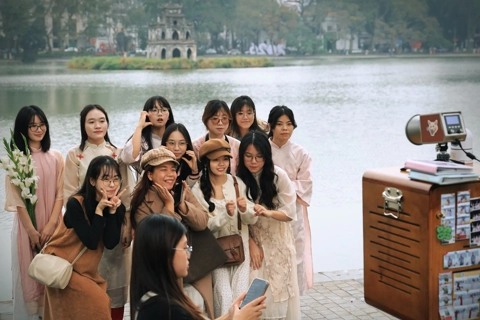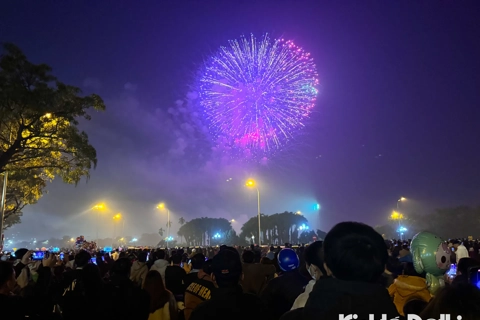Social Affairs
US trial on Monsanto sparks hope to Vietnam's AO victims
Aug 18, 2018 / 03:15 PM
Vietnamese AO/dioxin victims in 2004 lodged a lawsuit against 37 US firms, including Monsanto, for producing chemical toxins sprayed by the US army.
A closely-watched trial against agrochemical giant Monsanto held by San Francisco Superior Court in the US last week is expected to bring hope to Vietnamese people who exposed to dioxin/Agent Orange (AO) supplied by the corporation during the Vietnam War.
The indictment in the month-long trial showed that Monsanto’s weed-killer Roundup (glyphosate) has been accused of causing cancer in a lawsuit filed by Dewayne Johnson, a 46-year-old groundskeeper from Northern California.
Part of Johnson’s job was to apply Monsanto herbicides to school properties between 2012 and 2015.
The lawsuit alleges exposure to the weed killer and its active ingredient, glyphosate, caused Johnson to develop non-Hodgkin lymphoma (NHL).
Johnson filed a Roundup cancer lawsuit against Monsanto in 2016.
A lawyer told a jury in the trial opened on July 9 that Monsanto had known for 40 years its popular Roundup weed-killer is carcinogenic, but didn’t warn users and “bullied” independent researchers to safeguard its flagship product.
In The Monsanto Tribunal in The Hague, the Netherlands held on April 18, 2017 found Monsanto guilty of ecocide, which has left long-term consequences on the ecosystem of various nations, including Vietnam.
However, the US corporation, which specializes in manufacturing glyphosate – a broad-spectrum systemic herbicide (Roundup), rejected the ruling.
Monsanto has been linked with AO issues in Vietnam for years as it was one of the US firms supplying herbicides or “Agent Orange” using a variety of defoliants which US troops sprayed over southern Vietnam during 1961-1971 to “peel the jungle”.
The bi-product of the “Agent Orange”/dioxin, is known to have directly impacted the Vietnamese populations as it entered into the food chains, causing birth defects and cancers in an estimated 2.1 to 4.8 million Vietnamese people over the course of more than 10 years in Vietnam, and the harmful effects can be traced even decades later.
In 2004, Vietnamese AO/dioxin victims lodged a lawsuit against 37 US firms, including Monsanto, for producing chemical toxins sprayed by the US army. In 2009, an international court opened in France to deal with the AO matter and Vietnamese victims, but both the US government and sued companies refused to appear.
Merle E Ratner, a founding Co-Coordinator of the Vietnam Agent Orange Relief & Responsibility Campaign, said that there is a tidal wave of international public opinion for justice for Agent Orange victims including compensation from the US government and chemical manufacturers.
The indictment in the month-long trial showed that Monsanto’s weed-killer Roundup (glyphosate) has been accused of causing cancer in a lawsuit filed by Dewayne Johnson, a 46-year-old groundskeeper from Northern California.

Roundup weedkiller, a product of Monsato. Photo: ecowatch.com
|
The lawsuit alleges exposure to the weed killer and its active ingredient, glyphosate, caused Johnson to develop non-Hodgkin lymphoma (NHL).
Johnson filed a Roundup cancer lawsuit against Monsanto in 2016.
A lawyer told a jury in the trial opened on July 9 that Monsanto had known for 40 years its popular Roundup weed-killer is carcinogenic, but didn’t warn users and “bullied” independent researchers to safeguard its flagship product.
In The Monsanto Tribunal in The Hague, the Netherlands held on April 18, 2017 found Monsanto guilty of ecocide, which has left long-term consequences on the ecosystem of various nations, including Vietnam.
However, the US corporation, which specializes in manufacturing glyphosate – a broad-spectrum systemic herbicide (Roundup), rejected the ruling.
Monsanto has been linked with AO issues in Vietnam for years as it was one of the US firms supplying herbicides or “Agent Orange” using a variety of defoliants which US troops sprayed over southern Vietnam during 1961-1971 to “peel the jungle”.
The bi-product of the “Agent Orange”/dioxin, is known to have directly impacted the Vietnamese populations as it entered into the food chains, causing birth defects and cancers in an estimated 2.1 to 4.8 million Vietnamese people over the course of more than 10 years in Vietnam, and the harmful effects can be traced even decades later.
In 2004, Vietnamese AO/dioxin victims lodged a lawsuit against 37 US firms, including Monsanto, for producing chemical toxins sprayed by the US army. In 2009, an international court opened in France to deal with the AO matter and Vietnamese victims, but both the US government and sued companies refused to appear.
Merle E Ratner, a founding Co-Coordinator of the Vietnam Agent Orange Relief & Responsibility Campaign, said that there is a tidal wave of international public opinion for justice for Agent Orange victims including compensation from the US government and chemical manufacturers.









